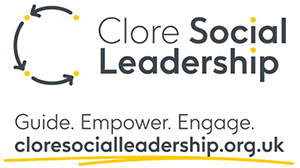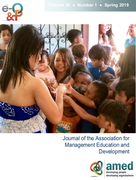Leadership as encounter
Wright, N. (2020), 'Leadership as Encounter - The Personal Touch', Clore Social Leadership, 29 May.
Talk about work with the poor and most vulnerable people in a community, the UK or the world, and the conversation turns quickly to words like strategy, evidence base, programmes, accountability and effectiveness. The underlying assumption is often that big is best, and that the best way to achieve big is to be well-planned and well-organised. After all, big means making a positive difference in more people’s lives, and that has to be good, right? Most beyond-profit organisations with a social purpose focus on some variation of income, influence and impact as their generic goals and indicators of success, with underlying theories of change and strategy maps to support them.
And I’m glad that they do. Imagine, for instance, a beyond-profit sector that worked in a purely ad hoc, spontaneous manner; resulting in e.g. unreliable, patchy availability of health and social care provision or inequitable access to it. Imagine work that’s purely instinctive and full of energy but unfocused, not thought-through and wasteful of resources. Imagine organisations that are corrupt or abusive, diverting or siphoning off assets away from those in need and penalising those who dare to challenge them. Against this risk-laden backdrop, I’m thankful for those leaders, organisations and institutions that work hard to do the right thing in the right way and to ensure integrity on route.
Yet something is missing, deeply and profoundly missing in all of this. And it really matters. I work alongside this woman in South East Asia from among the poorest of the poor. It’s lockdown and, nevertheless, she ventures out in a makeshift mask to buy food with the little money she has and to distribute it to strangers who are facing near-starvation. In doing so, she risks arrest, contracting the Covid virus, being robbed by the very people she’s trying to help or being viewed by locals as having access to spare cash and, therefore, a target for extortion. She looks at them directly with a warm smile, gives them what she has, tells them earnestly it’s a gift from Jesus and returns quietly home.
Hearing of this and feeling inspired by her example, two organisations contact me to ask if they can assist her with food distribution to the poor. I relay this offer and, yet, she turns it down graciously. I’m curious and I ask her why. She explains, ‘This isn’t a programme and it isn’t a transactional giving out of food. It’s a sacred, personal encounter with each and every person I meet: the poorest of the poor, who otherwise feel helpless, hopeless, invisible and unloved.’ I question her gently on this and ask if she wouldn’t be better saving and using the little money she has for her own family? She looks at me earnestly now: ‘How can I eat rice at home, while they outside (the poor) have nothing to eat?’
That, in a nutshell, is the crux of the matter. This woman’s vision, faith and values, deep compassion, burning determination to do what’s right whatever the personal cost, humbles me. I’ve spent my life in leadership roles in UK charities and international non-governmental organisations (INGOs), yet I’ve rarely met anyone who demonstrates such profound personal leadership. I’ve focused on the big picture, strategy, leadership, organisation, culture, effectiveness etc. and in the midst of all this, I’ve sometimes, without noticing it, allowed my heart to grow cold. I’ve permitted myself to stand too far at a distance, to lose sight of the very people, the real encounters, that make this work and life authentic and worthwhile.
* * * * *
Wright, N. (2020), 'Leadership as Encounter - The Personal Touch', Clore Social Leadership, 29 May.
Talk about work with the poor and most vulnerable people in a community, the UK or the world, and the conversation turns quickly to words like strategy, evidence base, programmes, accountability and effectiveness. The underlying assumption is often that big is best, and that the best way to achieve big is to be well-planned and well-organised. After all, big means making a positive difference in more people’s lives, and that has to be good, right? Most beyond-profit organisations with a social purpose focus on some variation of income, influence and impact as their generic goals and indicators of success, with underlying theories of change and strategy maps to support them.
And I’m glad that they do. Imagine, for instance, a beyond-profit sector that worked in a purely ad hoc, spontaneous manner; resulting in e.g. unreliable, patchy availability of health and social care provision or inequitable access to it. Imagine work that’s purely instinctive and full of energy but unfocused, not thought-through and wasteful of resources. Imagine organisations that are corrupt or abusive, diverting or siphoning off assets away from those in need and penalising those who dare to challenge them. Against this risk-laden backdrop, I’m thankful for those leaders, organisations and institutions that work hard to do the right thing in the right way and to ensure integrity on route.
Yet something is missing, deeply and profoundly missing in all of this. And it really matters. I work alongside this woman in South East Asia from among the poorest of the poor. It’s lockdown and, nevertheless, she ventures out in a makeshift mask to buy food with the little money she has and to distribute it to strangers who are facing near-starvation. In doing so, she risks arrest, contracting the Covid virus, being robbed by the very people she’s trying to help or being viewed by locals as having access to spare cash and, therefore, a target for extortion. She looks at them directly with a warm smile, gives them what she has, tells them earnestly it’s a gift from Jesus and returns quietly home.
Hearing of this and feeling inspired by her example, two organisations contact me to ask if they can assist her with food distribution to the poor. I relay this offer and, yet, she turns it down graciously. I’m curious and I ask her why. She explains, ‘This isn’t a programme and it isn’t a transactional giving out of food. It’s a sacred, personal encounter with each and every person I meet: the poorest of the poor, who otherwise feel helpless, hopeless, invisible and unloved.’ I question her gently on this and ask if she wouldn’t be better saving and using the little money she has for her own family? She looks at me earnestly now: ‘How can I eat rice at home, while they outside (the poor) have nothing to eat?’
That, in a nutshell, is the crux of the matter. This woman’s vision, faith and values, deep compassion, burning determination to do what’s right whatever the personal cost, humbles me. I’ve spent my life in leadership roles in UK charities and international non-governmental organisations (INGOs), yet I’ve rarely met anyone who demonstrates such profound personal leadership. I’ve focused on the big picture, strategy, leadership, organisation, culture, effectiveness etc. and in the midst of all this, I’ve sometimes, without noticing it, allowed my heart to grow cold. I’ve permitted myself to stand too far at a distance, to lose sight of the very people, the real encounters, that make this work and life authentic and worthwhile.
* * * * *
|
If you would like to read more about this remarkable woman in South East Asia, see: A Radical Heart
| ||

